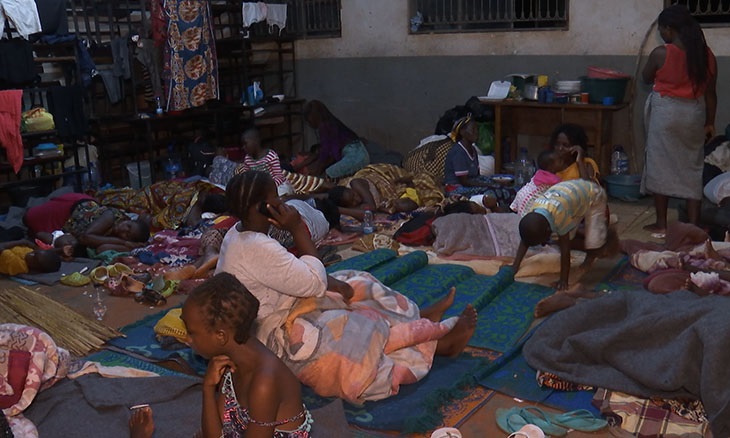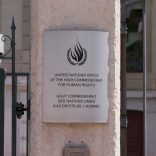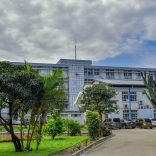Mozambique: Pivotal moment to strengthen torture safeguards, UN body says
Mozambique: Bad nights at accommodation centres – O País

Photo: O País
In accommodation centres in the town of Boane, Maputo province, flood victims are sleeping on the floor, on desks or sitting because they have not received mattresses or blankets. ‘O País’ toured these places and returned with reports of bad nights.
It was around 8:00 p.m. when we arrived at the first centre, which is located at the Joaquim Chissano Secondary School and shelters around 1,800 flood victims.
We went there with only one goal: to see how the nights are spent. We were surprised by what people told us about bad nights and more.
“This is not living. I can’t say that we’re fine like this. It’s not easy. We are in a complicated situation. Our diet is difficult and worse for children. It’s very difficult to have food. We queue for food, but it’s not always possible. And we just sit there. We have nothing,” says one of the victims, summarizing the drama that the displaced people experienced.
They left everything behind to save their lives which now weigh heavy in the accommodation centres. “All our food and possessions were washed away. We are living without anything that is ours. Life is very heavy,” says Florência Mário, one flood victim, with a tone of revolt.
The days in the accommodation centres are difficult, and when the sun goes down, families prepare for a nightmare. The victims at the Escola Secundária Joaquim Chissano accommodation centre sleep on school desks or even underneath them.
“I can’t even turn around. If I get tired, in this position I’m in, I wake up and sit down because it really bothers me. This is made of wood. I do not move. I’m in jail and I stay that way until dawn. During the day, I borrow a mat from any brothers who have one,” says Agostinho Abdurremane.
The displaced don’t even have blankets, so can’t forget the harsh reality of the present for even one night.
“I fixed a blanket. I made a split. One part is a ‘esteira’ [straw mat] and the other part I use as a blanket. We have nowhere to complain. There is no way. That’s life,” says Atanásio Feliciano in a resigned tone.
The resettled people live in uncertainty or even in doubt whether, someday, they will be able to have mattresses or blankets. “I’ve been here a long time and I’ve never heard anyone talk about ‘esteiras’ [straw mats] . We are sleeping on the mats, as you see,” says Fernando Alberto.
Unlike the men, the women managed to take with them capulanas, blankets and esteiras with which they improvise to sleep with their children, 50 to a room.
“Nights cannot be easy, because we sleep on cement. The capulana I have is too small for me and my grandchildren,” complains Maria Nhaca.
They thought that, once rescued from the floods, they would have better conditions in the accommodation centres – a frustrated expectation.
“We thought that once we got here, we would have somewhere to sleep and something to cover us. But it’s been three days since we’ve been given anything. They still haven’t said anything until today. We don’t know if they will give us blankets or something we can lay down to sleep on, or when they will release us to return to our homes, because they say they are still submerged,” explains Carmelinda Manhiça, another flood victim.
Added to this is the age-old complaint about food. “When the time comes to feed us, they don’t. After having food at 10:00 a.m. yesterday (Monday), at 10:00 p.m. I only got ‘xima’ without any ‘curry’. So, I’m having a hard time with stomach pains,” Esmeralda Mussa complains.
We continue our tour of the accommodation centres. We arrived at the Boane-Sede Primary School, where there are around 800 flood victims, and the complaints continue. “At this school, we have a lack of water to take a shower, our toilets are not in proper condition, and there are days when we delay dinner because we lack firewood to be able to cook,” says Laura Jacinto.
The displaced also lack mosquito nets to prevent malaria. But there is a palliative: “We received ‘Dragao’ [mosquito coils] from the Red Cross, so that we could light them and spend the night minimally protected.”
There are rooms that don’t even have lighting.
“There, where they took us from, there were mosquito coils and candles for lighting. Here where we are, there is not even electricity. They haven’t even told us anything yet,” says Pérola Lumbela cautiously.
A revolting situation. “We are treated as if we were people who are begging for alms. But we did not ask for what happened to us”.
By Dário Cossa












Leave a Reply
Be the First to Comment!
You must be logged in to post a comment.
You must be logged in to post a comment.